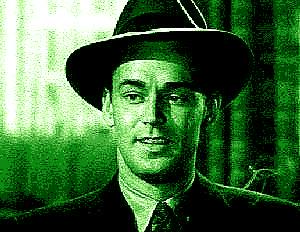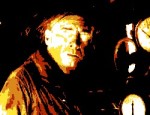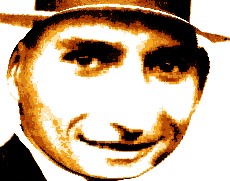Film Review
Hot on the heels of their successful partnership in
This Gun for Hire (1942), Alan
Ladd and Veronica Lake were reunited in another noir thriller,
The Glass Key, with Ladd again
playing the phlegmatic anti-hero and Lake his sultry femme
fatale. This film was the second adaptation of Dashiell Hammett's
popular 1930 novel, the first being a pretty lacklustre 1935 film of the same name,
directed by Frank Tuttle and starring George Raft and Claire Dodd.
The Glass Key was released a
year after another celebrated Hammett adaptation - John Huston's
The Maltese Falcon
(1941). The influence of the latter film is evident through
director Stuart Heisler's use of the same film noir techniques which
Huston had introduced. Although its noir cinematography is just
as effective as in Huston's film at conveying atmosphere and tension,
The Glass Key is a much cosier film
and lacks the hard, cynical edge of
The
Maltese Falcon. Its impact is undermined somewhat by its
soft ending, which is of the traditional Hollywood variety.
The Glass Key still has its share of darker moments,
though. Most disturbing are the scenes depicting a developing
sado-masochistic relationship between Ed (Alan Ladd) and a sadistic
henchman (William Bendix), which has some very noticeable homoerotic
undertones. The six foot Bendix gave the five foot five Ladd
quite a pummelling, knocking him unconscious in one scene (which is
retained in the final print). Ladd's performance is every bit as
restrained and darkly introspective as it was
This Gun for Hire, something which adds greatly to
his character's moral and sexual ambiguity. It may look
slight when compared with
The
Maltese Falcon, but, judged on its own merits,
The Glass Key is a compelling and
stylish noir thriller. After this, Alan Ladd and
Veronica Lake joined forces on another classic noir,
The Blue Dahlia (1946).
© James Travers 2008
The above content is owned by frenchfilms.org and must not be copied.
Film Synopsis
Former crook Paul Madvig offers his services as the electoral agent
for the scrupulously honest Ralph Henry in the coming mayoral elections
- partly to show he is a reformed character, but also so that he can
win the girl he loves, Henry's daughter Janet. Unfortunately,
Janet has no real interest in him and her eyes have already started to
wander - in the direction of his best friend, Ed Beaumont. When
Henry's wayward son is found dead in the street, suspicion immediately
points in the direction of Madvig. As he tries to get to the
truth and clear his friend's name, Ed finds himself up against Henry's
ambitious, and very dangerous, political opponents...
© James Travers
The above content is owned by frenchfilms.org and must not be copied.



